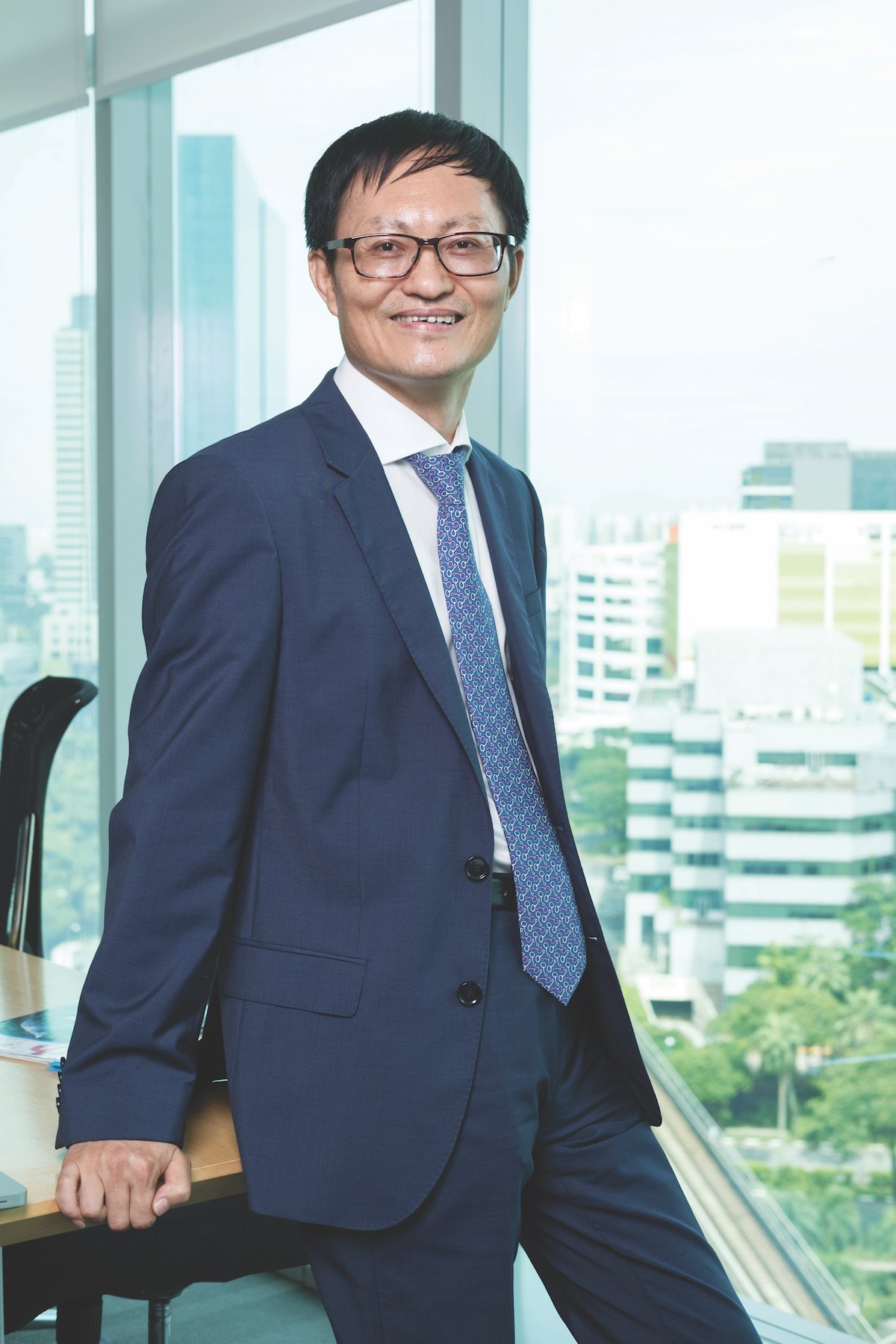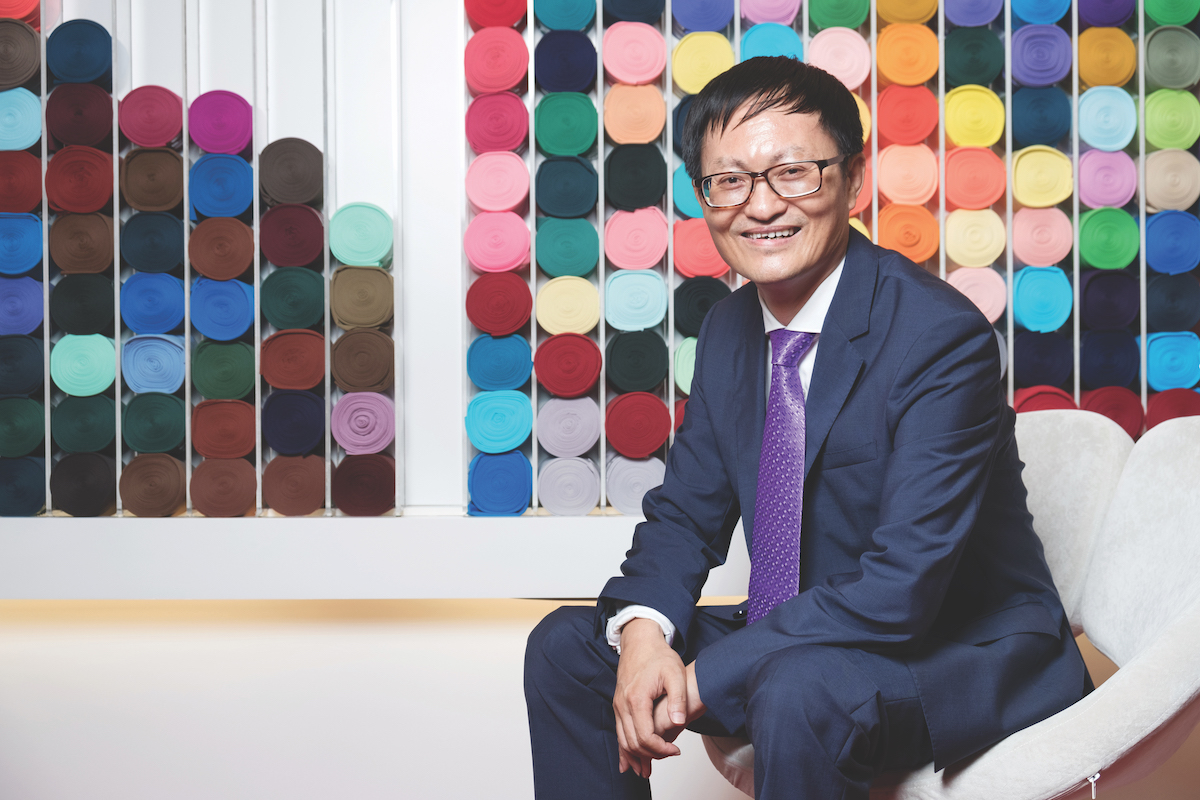Xu Yalin knows all about chemistry; he has degrees in the subject to prove it. Armed with his Bachelor’s and Master’s and a fierce passion for all things that mattered, he launched a career in science 3 decades ago. Today, however, the managing director of DyStar in Singapore is more committed to 2 words probably never heard in the same sentence as chemistry during his years at university: sustainability and culture.
Yet Yalin is convinced these 2 words should not only go hand-in-hand, but are pivotal to the future of industry and business. “Sustainability is no longer an option, but essential,” Yalin enthuses, “and without the right culture at the core of a company, business won’t grow.”
Surely, a lean to the green and a commitment to compassion is at odds with a man driven by science, business and profitability — a man with an impressive pedigree in marketing and development around the world during his years at Unilever and Ciba Specialty Chemicals, and a man who turned DyStar’s fortunes around dramatically just 2 years after joining the textile company in 2010.
Back in the black
“For 15 years, DyStar was not profitable, and of course the challenge I faced from the very beginning was to turn that around,” he says. “The first thing I saw was that, like many other multinational companies, DyStar had a very complicated system. In particular, it had a complicated product range, with probably only 20% of the products making about 60% of the sales revenue. I knew what I could do to improve this, and the first step was to reduce the complexities to improve efficiency and productivity by simplifying the process.”

Yalin’s simplification process catapulted an almost crippled DyStar facing insolvency in 2009 to earning net US$50 million in 2013 and US$100 million in 2016, jumping closer to where this company with such a rich history in textiles should be. Founded in 1995 as a joint venture between Hoechst AG, Bayer Textile Dyes, and Mitsubishi, DyStar entered into another partnership 5 years later with BASF, AG Textiles and Mitsui, inheriting a legacy spanning more than 100 years and boasting some of the most remarkable innovations in the chemistry of synthetic dyes.
Over the past 10 years, DyStar has expanded further, completing a series of strategic acquisitions including Color Solutions International, Yorkshire Americas, the Rotta Group, Texanlab, The Boehme Group, and Lenmar Chemical Corporation, before being jointly acquired by Zhejiang Longsheng Group and Kiri Industries in 2010.
It now employs about 2,000 people in more than 50 countries, running production facilities in 12 of them. Initially launched as a colouration specialist for the textile and leather industries, DyStar has evolved into a one-stop shop providing solutions to dozens of consumer and supplier demands. Naturally, it still offers a complete range of colourants to enhance the latest in fashion or car interiors, but paper and plastic have been introduced into the mix, with additional services in consultancy, training and textile testing also available.
Going green
Along with the challenge of expansion, however, has come the even greater demands and pressure from governments, environmentalists and consumers for the textile industry worldwide to clean up its act — not really surprising in an industry that has one of the largest environmental footprints in the world. To put it simply, studies estimate that the net carbon footprint of the average T-shirt is 6 kilograms, about 20 times the weight of the product itself. It defies imagination to determine how many ‘footprints’ are stored in just one closet, in one bedroom, in one home, in one street, in every corner of the globe.

“Old chemicals are now of no use to the global textile industry, so we’re continuously innovating to bring cleaner chemicals as substitutes.” – Xu Yalin
DyStar was under no illusion it had to act fast to mitigate the adverse environmental, social and economic impacts the manufacturing and marketing of its products was having, and met the challenge head on in 2003 with the launch of econfidence, a program tailor-made to deal with product safety and ecology issues.
The econfidence program provided a long-term strategy to make dyes and chemicals compliant with Restricted Substances List (RSL) requirements, a huge call considering DyStar product components contain more than 5,000 individual chemicals, but one they successfully answered. As one of the first textile companies to not only tackle environmental concerns but also implement a dedicated game plan, DyStar also attracted the approval of regulators.
“Our econfidence program was meticulously developed to face increasing pressure from public regulators to clean up many parts of the world, and we met their expectations,” Yalin says. “As environment regulations become increasingly stringent and more strictly enforced, some key brands and their retailers are moving to green the entire industry. In turn, their production partners are getting the message that sustainability is vital to maintain long-term business relationships. This is critical to the industry as well as for us, and we’ve responded proactively.”
“My personal philosophy, and as a company executive, is that both the company and the employees have to be treated fairly. I always encourage fairness and trust.” – Xu Yalin
In 2011, DyStar expanded its commitment to the environment and released its first ‘Annual Carbon Footprint’ report. Based on 2010 emissions data, the company began implementing measures aimed at reducing the carbon intensity progressively to achieve a 20-per-cent reduction by 2020. A commitment from everyone in the company is needed to manage this carbon footprint more effectively, with creative solutions required to ensure greater energy efficiency across all DyStar plants, laboratories and offices. A first step was to generate the Sustainable Textile Solutions (STS) division, which helped establish the company as a responsible partner for managing environmental issues for the entire textile supply chain.

“It’s no secret DyStar is the most sustainable and responsible supplier of dyes,” Yalin says. “Old chemicals are now of no use to the international textile industry, so we’re continuously innovating to bring cleaner chemicals as substitutes to our customer so they can then comply with regulation requirements.”
A golden age of culture
While it is crucial to Yalin that DyStar’s environmental strategy has been one of the keys to the company’s sustained business growth and working in partnerships with suppliers and customers to ensure environmental expectations are met, he understands the future of a company in today’s competitive world lies fundamentally within the company itself. “You have to get the company’s culture right,” he says. “When I joined DyStar, it was quite complicated. A lot of people were working on their own without a clear vision; there wasn’t much involvement, and it was too bureaucratic. I saw this as one of the key reasons why the company was not profitable for many years. So I changed a lot of things, and the first change was to get a good cultural fit.”
In order to get this cultural fit, Yalin recognises that employees must feel a sense of ownership, of belonging and pride in the company’s success and profitability. He believes that employees who feel they’re valued and seen as contributing to triumphs perform more efficiently than those who feel they’re just working for the business. “They must feel they’re not just working for the company, but also for themselves,” he says. “So we’ve implemented an excellent incentive performance-related system. Our employees work knowing that if the company makes money and is profitable, they’ll be rewarded.
Yalin also realises that trust and fairness are the keys to spreading that sense of ownership among all the DyStar companies and its thousands of employees across the world. “My personal philosophy is that both the company and the employees have to be treated fairly. I always encourage fairness and trust,” he says. “I’ve set up a lot of policy and systems in process to ensure everything is clear and talked about openly. So employees who contribute understand they’ll receive good rewards. It’s a system based on fairness, family and a sense of ownership. That’s the core culture of the company.”
As a company executive, Yalin leads by example. He’s the only member of the Board based at DyStar’s headquarters in Singapore, and he understands the responsibility and important legacy that goes with leadership. “To be a good leader, or a successful leader, you must be a missionary,” he says. “You need to lead by example; you need to design good, achievable but also challenging targets and provide an execution plan for them to be implemented. Then you walk together with the employees to reach the goal; they can then enjoy the success and share in that success.”



